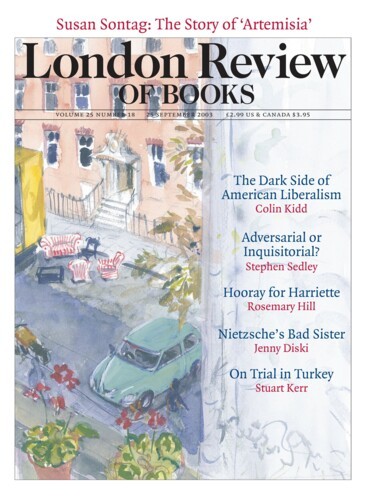Frank Field has been Birkenhead’s MP since 1979. He was, for the first year of Blair’s Administration, the Minister for Welfare Reform in Harriet Harman’s DSS. Harman and Field didn’t get on very well, and both were anyway sacked after 15 months. Not being a minister has given the former Young Conservative more time for writing. His 24th book is Neighbours from Hell: The Politics of Behaviour (Politico’s, £8.99). As its subtitle suggests, it isn’t a spin-off from the television programme of the same name, but a tract on anti-social behaviour, its supposed causes and a proposed solution. The problem was first brought to Field’s attention a few years ago, when a group of pensioners came to his surgery at Birkenhead Town Hall to report ‘young lads who ran across their bungalow roofs, peed through their letterboxes, jumped out of the shadows as they returned home at night, and, when they were watching television, tried to break their sitting-room windows’. It’s an unpleasant tale. Field tells others like it, and worse: teenagers throwing slates at passers-by from the roof of an abandoned pub; an ambulance station being vandalised. There’s a petition in my local off-licence in North London asking the police to do something about the prostitutes and crack dealers on a nearby estate. Accounts of their activities can be found in recent editions of the Highbury & Islington Express, alongside stories about ‘youths’ who regularly gather in a street in Finsbury to ‘smoke, drink, ride mopeds and generally make life a misery for the people living there’, vandalising cars, robbing houses and threatening residents with crowbars.
Field thinks that this anti-social activity is new, and he also thinks he knows the reason for it. ‘Britain began its long march to respectable behaviour over two hundred years ago,’ he says, but we are currently undergoing a ‘counter-revolution against common decency’. It’s Whig history with a twist. Part of the trouble is secularisation, apparently, an argument buoyed up by the ‘roar of faith’s receding tide’ and so on. (The rhetoric is grotesque throughout. Everything that isn’t receding is ‘on the march’: the ‘recruiting sergeants of the new nihilism’, ‘scarcely disguised semi-barbarism’ and the new ‘horseman of the apocalypse’.) It was all much better in Victorian times, when children respected their elders and knew their place; that their place may have been halfway up a chimney or down a coalmine is tactfully overlooked. ‘The root cause of anti-social behaviour,’ Field says, ‘stems from the failure of some families to promote a set of common decencies, which centre on a proper consideration of others.’ The assertion that a root stems from something else isn’t a good sign, and Field’s logic turns out to be as muddled as his metaphor: the ‘root cause’ of anti-social behaviour, he seems to be saying, is a willingness on the part of certain people to behave anti-socially. This isn’t very helpful.
A better contender for the ‘root cause’ title is poverty. Field thinks he’s pre-empted this claim in his chapter that’s called (ironically, obviously) ‘It’s the poor, stupid!’ He points out that the people who suffer most from anti-social behaviour are, like the majority of the worst offenders, among the least well off. But to say that the cause of anti-social behaviour is poverty is not the same as saying: ‘These people are poor, therefore they are anti-social.’ Field thinks that it is the same, because he can’t get away from the idea that the problem has to do with bad character. The really important thing, however, demonstrated by the evidence that Field has marshalled, is the high correlation between the worst instances of anti-social behaviour and the most impoverished neighbourhoods. ‘Here we review,’ he writes, ‘those national surveys which show that the poorer an area is, the worse is the anti-social behaviour.’ You might hope he would conclude that poverty is the problem, of which anti-social behaviour is a symptom. Far from it – and if the poor will always be with us, or at least with each other, they need to learn how to behave. ‘The inability or unwillingness of some people to think over the longer-term,’ Field writes, ‘has been reinforced by a society which guarantees minimum rights and income to individuals almost irrespective of their behaviour.’ So he proposes the further impoverishment of the undeserving poor.
Send Letters To:
The Editor
London Review of Books,
28 Little Russell Street
London, WC1A 2HN
letters@lrb.co.uk
Please include name, address, and a telephone number.

